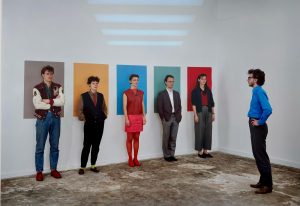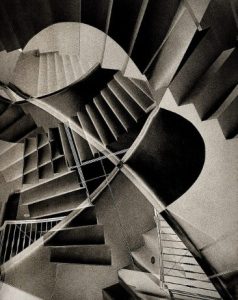English follows Hebrew
הקיר האדום פצוע. חורים נפערו בו ופרורי הטיח נשרו וזרקו שיבה על האגרטל האדום על השולחן .

אשקלון, רחוב הצופים 3. פאינה ויצחק האלאמייזה בדירתם בבניין שספג פגיעה ישירה ואחד מדייריו נפצע קשה. בצילום המאופק, המדויק כל כך נתן דביר מעביר הוויה שלמה שעברה טלטלה. מפגש של אדום אלמדובר, אדום קולנועי, עם מלחמה בה הקשרי האש, המוות, והדם פסקו מלהיות דימויים אמנותיים והם ממשות, כאב שנספג בכל חלקיק ותא . יסודות הבניה הזהירה, האוהבת, של החלל הביתי עם הבובה החייכנית התלויה שמחזיקה חמסה, הכיסאות הלבנים וארונות המטבח הכהים הזדעזעו עד היסוד. הכאב ניבט מעיני בני הזוג שפניהם מכוסות מסכות, להגנה מהקורונה, הגנה ממגפה בעת מלחמה. סחרחורת קריסה.

אדום. השימוש בו כצבע קיר ביתי בישראל נדיר. הוא מקפל געגועים, למקום אחר, תרבות שתשוקה נפגשת בה בדבקות רליגיוזית ואלימות עטופה בסובלימציות. צבע אדום הוא האות לכניסה למרחבים מוגנים, צבע הפריחה שאומצה לשיווק התיירותי המוצלח של האזור כדרום אדום. בסרטיו של פדרו אלמדובר, אחד היוצרים האהובים אלי, האדום הוא שחקן נוסף בסרטים כמו עקבים גבוהים (1991), דרך הכל אודות אמא (1999), חולייטה (2016) אם לחשוב על אחדים. אדום בחלל דירה באשקלון היא הצהרה, חלום, שהצילום הזה , מרוסן כל כך למרות הצבע, מראה את הערעור שלו באופן שמחלחל לתודעה כשהעין עוברת מבני הזוג השקועים בצערם ואצילים גם בבגדי הבית, לכתם השחור בתקרה ולחורים בקיר .

אדום דם, ואדום הקיר כזה, מתקשר לדמו של ישוע, לדמם של קדושים, לבריתות דמים, לקורבן ולישועה וגם לדם מטמא, כמו דם נידה. החורים -פצעים מעלים על הדעת את ציורי תומא המפקפק, תלמידו של ישוע שנגע בבשר פצע הצליבה של ישוע כידי להאמין, שאכן, קם ישוע מהמתים. באגרטל על השולחן צמח פלסטי שמזכיר עלי דקל וכך ההקשר האיקונוגרפי הנוצרי מתעבה, עם מחשבות על הדקל שנחשב לסמל ניצחון הרוח על החומר, סמל של מרטירים.
הצילום בנוי כדיפטיך משמאל, בני הזוג ומימין החלל האדום כשהבובה בתווך, מגשרת בין חלל אקספרסיבי, ייצוגי למטבח, הגשמי. האור מגיע ממחוץ לצילום האם מחלון ( או פתח שנפער?). הוא משתקף בדלת הזכוכיות של הארון ומאיר ברוך את הזוג בסצנה של שבר צורב , לוהב באדום.
Peter Doig
האקדמיה של החלון – הרצאות ד”ר סמדר שפי ב ZOOM
יום ב, 31 מאי 2021, ב 20:00
לינק לרישום ותשלום
https://forms.gle/ah736tLU1HeL5wmYA
פיטר דויג נחשב לאחד האמנים הבינלאומיים המובילים בעולם. עיסוקו בציור פיגורטיבי המבוסס על צילום, סרטים, וקטעי עיתונות מפתיע בדגשי התבוננות בלתי שגרתיים, במהילה של תיאור והמצאה.
זהו ציור מרגש, לגמרי בן הזמן ובכל זאת מתכתב, לצד אמנים בני זמננו גם עם אמני עבר בולטים. מאז 2002 הוא חי בטרינידד (קאריביים) וההשוואות לגוגן מתבקשות וגם עולות. ההשפעה שלו על סצנת הציור הבינלאומי והישראלי רבה. בהרצאה נתבונן על עבודותיו ודרכן הציור הפיגורטיבי הבינלאומי מהעבר וההווה.

Ashkelon, 3 Hatzofim Street: On Natan Dvir’s photograph
The red wall is wounded. It has holes, fragments of plaster have fallen off, powdering the red vase with white.
Ashkelon. 3 Hatzofim Street. Faina and Yitzhak Halamayze in their apartment in a building that suffered a direct hit by a missile, which severely wounded one of the building’s residents. In the photograph, restrained and precise, Natan Dvir transmits an experience that shocked them to their very core. This is a visual encounter of Almodóvarian red, cinematic crimson, and war, in which contexts of fire, death, and blood cease to be artistic images and become concrete, generating pain absorbed in every bodily cell. The foundations of the careful, lovingly construction of the domestic space with its smiling hanging doll holding a hamsa good luck trinket, white chairs and dark kitchen cabinets, were irrevocably shaken up. The pain looking out from the couple’s eyes, their faces half covered by medical masks to protect them from the pandemic, during war, portrays their shattered world.

Israeli homes seldom have red walls. In this case, it embodies longing for a different place, for a culture in which passion and desire are mingled religious devotion and sublimated violence. The alarm “Color Red” is the warning signal to enter protective spaces as well as the color of the blooming flowers chosen as the brand for the tourism campaign “Red South.”

Pedro Almodóvar, one of my favorite filmmakers, treats red is one more actor in films such as High Heels (1991), through All about my mother (1999) to Julieta (2016), to name but a few. Red in the apartment in Ashkelon is a statement, a dream, which the photograph – so restrained despite the color – shows its subversive aspect in a way that filters into the viewer’s consciousness, from the grieving, noble couple in their nightclothes, to the patch of black on the ceiling and the holes in the wall.
Blood red, and the red of the wall in the photo is associated with the blood of Jesus and of martyrs, with blood covenants, sacrifice and salvation as well as contaminating blood, such as menstrual blood. The holes as wounds bring to mind the paintings of Doubting Thomas, one of Jesus’s disciples, who had to touch Jesus’s wound from the crucifixion in order to believe in the resurrection. The plastic flower in the vase on the table, reminiscent of the palm, is Christian iconography, connotes the victory of spirit over matter, the symbol of martyrdom.

The photograph is structured as a diptych, with the couple on the left, the red space to the right, and the doll in the center as mediating between the space of the kitchen, representative of the material world. The light comes from outside of the photograph, whether from the window (or an opening?) or as a reflection of the cabinet’s glass door, gently illuminating the couple in the scene of harsh disaster, flaming in red.





